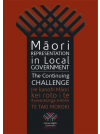Public discussion about Māori representation in local government has been re-ignited by the government decision not to adopt the recommendation of the Royal Commission on Auckland Governance that there should be three councillors representing Māori on the new Auckland Council.
The Human Rights Commission, in its annual review of race relations, identified Māori representation in local government and an effective voice for Māori in the decisions of the new Auckland Council as being among the top ten race relations priorities for 2010 (Human Rights Commission, 2010, p.5). Unless positive steps are taken, Māori representation in local government will continue to languish well below the proportion of Māori in the population. The decision not to provide for Māori seats on the new Auckland Council was a missed opportunity.
The Royal Commission, in coming to its recommendation, considered the precedent of the Bay of Plenty Regional Council (Environment Bay of Plenty), which has had direct Māori representation since 2004 on the same basis as the Māori seats in Parliament (Royal Commission on Auckland Governance, pp.477-496). The evidence of the council to the Royal Commission was that the system worked well.
Over a period of two days in April, the Commission conducted individual interviews with the Chair of Environment Bay of Plenty, a number of councillors, council managers and iwi representatives. Most were positive about the system of Māori constituencies and felt it had helped the council to better meet its obligations for Māori participation under the Local Government Act 2002. Some went as far as to say it had transformed the council’s relationships with Māori and its way of doing business. Few would want to revert to the previous system. Quotes from them in this discussion paper are from the interviews conducted. The recommendations, however, are the Commission’s alone.
Since the passage of the Local Electoral Amendment Act 2002 all councils have had the option of establishing Māori constituencies or wards on the same basis as Environment Bay of Plenty, by resolution of the council challengeable by a poll of all voters. A number of councils have considered the option, but none have taken it up. The Act does not provide for Māori themselves to determine whether they wish to be represented as Māori. Since the first draft of this paper the Commission has conducted a survey to establish how many councils have considered the option and what they decided. The results are included in this report.
This paper now also includes details of the recent private member’s bill proposed by Māori Party MP Te Ururoa Flavell seeking to enhance the provisions for Māori representation. The bill was defeated on its first reading in June 2010. Other new material includes an outline of the current provisions for Māori representation among appointed Commissioners to Envrionment Canterbury, and the discussion on Māori representation at the annual Diversity Forum in August 2010.

